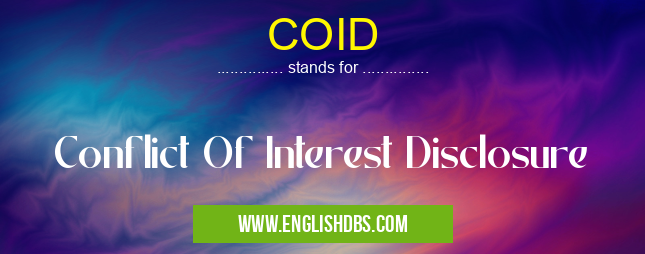What does COID mean in UNCLASSIFIED
COID stands for Conflict of Interest Disclosure. It is a legal requirement in many industries, such as healthcare, finance, and government, for individuals to disclose any potential conflicts of interest that they may have. This disclosure is important to ensure that decisions are made objectively and fairly, and to prevent any potential conflicts of interest from compromising the integrity of the decision-making process.

COID meaning in Unclassified in Miscellaneous
COID mostly used in an acronym Unclassified in Category Miscellaneous that means Conflict Of Interest Disclosure
Shorthand: COID,
Full Form: Conflict Of Interest Disclosure
For more information of "Conflict Of Interest Disclosure", see the section below.
What is a Conflict of Interest?
A conflict of interest arises when an individual has a personal or financial interest that could potentially influence their decision-making process. This conflict may be real or perceived, and it can arise in various situations, such as:
- When an individual has a financial stake in a company or organization that is involved in the decision-making process.
- When an individual has a personal relationship with someone who is involved in the decision-making process.
- When an individual has a bias or prejudice that could influence their decision-making process.
Purpose of COID
The purpose of a COID is to identify and disclose any potential conflicts of interest that an individual may have. This disclosure allows the decision-makers to take steps to mitigate or eliminate the conflict, such as by recusing the individual from the decision-making process or by taking other appropriate measures to ensure that the decision is made objectively and fairly.
Types of COID
There are various types of COIDs, depending on the industry and the specific situation. Some common types of COIDs include:
- Financial COID: Discloses any financial interests that an individual may have in a company or organization that is involved in the decision-making process.
- Personal COID: Discloses any personal relationships that an individual may have with someone who is involved in the decision-making process.
- Bias COID: Discloses any biases or prejudices that an individual may have that could influence their decision-making process.
Essential Questions and Answers on Conflict Of Interest Disclosure in "MISCELLANEOUS»UNFILED"
What is a Conflict of Interest Disclosure (COID)?
A COID is a document that discloses potential conflicts of interest that may arise in a professional relationship. It outlines any financial, personal, or other connections that could influence an individual's objectivity or impartiality.
Why is COID important?
COID promotes transparency, trust, and accountability by ensuring that individuals are aware of any potential conflicts of interest that may affect their decision-making. It helps to maintain ethical standards and prevent biases from influencing professional conduct.
Who should complete a COID?
Individuals in professional roles, such as healthcare providers, scientists, government officials, and financial advisors, typically complete COIDs. It is essential for anyone who may encounter situations where their personal interests could conflict with their professional responsibilities.
What information should be included in a COID?
COIDs typically include details about the individual's financial relationships, personal connections, and any other potential conflicts of interest. This can include investments, employment, family ties, and affiliations with organizations.
How are COIDs used?
COIDs are used by institutions and organizations to assess any potential conflicts of interest and determine if they need to be managed or mitigated. They can also be used to educate individuals about their ethical obligations and ensure that they are acting in the best interests of the organization or clients.
What are the consequences of failing to disclose a conflict of interest?
Failing to disclose a conflict of interest can damage trust, undermine the integrity of the professional relationship, and lead to legal or ethical consequences. It can also result in bias, unfair treatment, and compromised decision-making.
Final Words: COID is an important tool for ensuring that decisions are made objectively and fairly, and for preventing any potential conflicts of interest from compromising the integrity of the decision-making process. By disclosing any potential conflicts of interest, individuals can help to ensure that decisions are made in the best interests of the organization or the public.
COID also stands for: |
|
| All stands for COID |
